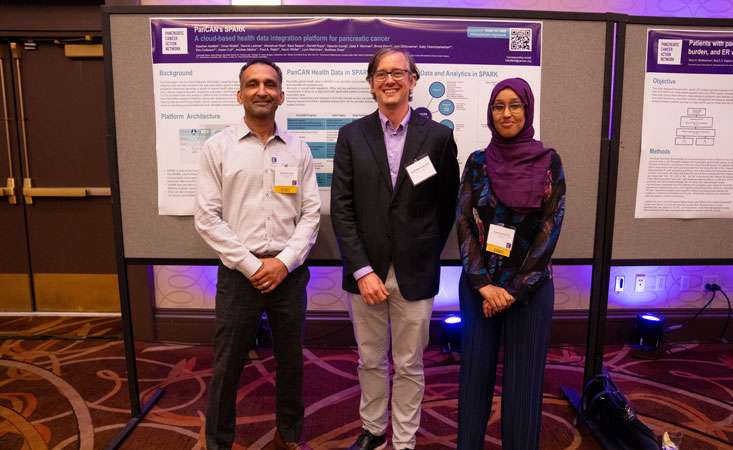
(L-R) Sudheer Doss, PhD; Jack DiGiovanna, PhD; and Kawther Abdilleh, PhD.
February 11 is International Day of Women and Girls in Science. The day is an opportunity to promote full and equal access to and participation in science for women and girls and highlight the challenges they still face in the field.
Women in science, technology, engineering and mathematics (STEM) are extremely underrepresented. According to the Global Gender Gap Report (2023), women only comprise of a little over 29% of the field. The world needs more women in science because women in science change the world.
To celebrate this important day, we’ve asked PanCAN’s Director of Data Science and Informatics Kawther Abdilleh, PhD, six questions about women in STEM and what and who inspired her to choose a career in the sciences.
PanCAN: When did you realize you wanted to go into STEM as a career?
Kawther: At a young age, I was introduced to biology, chemistry, and computer science by my middle school teachers as well as my aunts and uncles, who were all pursuing careers in STEM disciplines. This led to my desire to follow in their footsteps and pursue a career in STEM.
PanCAN: What did your educational and career path look like – how did you end up at PanCAN?
Kawther: I have a BS degree in Computer Science from Marymount University and a PhD in Molecular & Cellular Biology from the University of Maryland, College Park. After graduate school, I worked as a postdoctoral fellow at Georgia Tech. Throughout my academic experiences, I used bioinformatics and computational tools to analyze large-scale genomics data.
Before joining PanCAN, I worked on teams where I helped design and build bioinformatics data solutions for cancer researchers.
I came across a job advertisement for a position to manage the PanCAN SPARK platform. I was eager to apply all the skills I’ve acquired over the years to this position at PanCAN.
PanCAN: What is PanCAN doing that excites you the most?
Kawther: I am most excited about PanCAN’s research and clinical initiatives. I am impressed with how PanCAN continues to move the needle forward in the fight against pancreatic cancer. Not only is PanCAN funding leading-edge pancreatic cancer research, but it is also leading in research and clinical efforts to improve patient outcomes in programs, such as the Early Detection Initiative, Precision Promise, and the SPARK platform.
PanCAN: What are some ways we can encourage women to embrace science early on?
Kawther: I think two main ways we can encourage young girls and women to embrace science early on are:
- Incorporating & teaching about famous female STEM professionals of the past and present in early education.
- Challenging outdated notions that STEM disciplines are not for girls/women.
PanCAN: How important is representation in science?
Kawther: Representation is very important in science. Having relatable mentors is a key motivator for underrepresented groups to enter scientific fields. It really brings diversity of thought and experiences to science which contributes to the richness of the field in the form of new ideas and potentially new solutions.
PanCAN: Do you have any female mentors or role models in your field?
Kawther: Two of my aunts worked in research labs in biopharma. As a kid, I loved hearing about the research they worked on and was always interested in learning more. They helped foster my love of science and encouraged me to pursue a career in STEM.
Want to learn more about Kawther and the work she’s doing at PanCAN? Watch her talk about SPARK, PanCAN’s health data integration platform for pancreatic cancer research:
A big PanCAN thank you to Kawther and women around the world making a difference in the STEM field.





